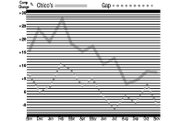2004 Retrospective Retail Sales Specialty Stores: Chico's Soars, Gap Coasts
While shopping centers increasingly devoted their real estate to teen fashions in 2004, Chico’s FAS Inc. earned strong same-store sales by selling fashionable clothes to baby boomer women.
During the first part of the year, the Fort Myers, Fla.–based retailer continued the robust comparablestore sales it had enjoyed since 1999. The stellar sales started with a December 2003 comparable-store increase of 24.3 percent and reached a peak in February 2004 with a 28 percent same-store rise.
Chico’s continued posting doubledigit increases until August, when the company’s same-store sales rose only by 3.6 percent. Chico’s President and Chief Executive Officer Scott A. Edmonds blamed Hurricane Charley for devastating sales.
In September, Chico’s comparable sales started climbing, but increases remained in the single digits, leaving analysts wondering whether the company was going to be a victim of its own success. Adding to the competition were San Francisco companies Gap Inc. and The Gymboree Corp., which both announced in 2004 that they would start retail concepts for baby boomer women.
Chico’s also marked the year with expansion. The company hired Chuck Nesbit as senior vice president of strategic planning and business development and launched intimate apparel concept store Soma by Chico’s.
As for Gap, known as the world’s largest specialty retailer, 2004 was a year of challenges.
Analysts praised Gap’s management team—helmed by Paul Pressler, president and chief executive officer—for turning around the company after lackluster sales in 2003. Many also gave high marks to the company’s retooled marketing efforts, which feature Sarah Jessica Parker. In addition, the company began developing business in new markets, including accessories stores and boutiques for baby boomer women.
But these efforts did not translate into sales. During the second half of 2004, Gap reported same-store sales declines.
Wachovia retail analyst Joe Teklits predicted Gap would spend 2005 making “small improvements,” not major changes.
—Andrew Asch






















